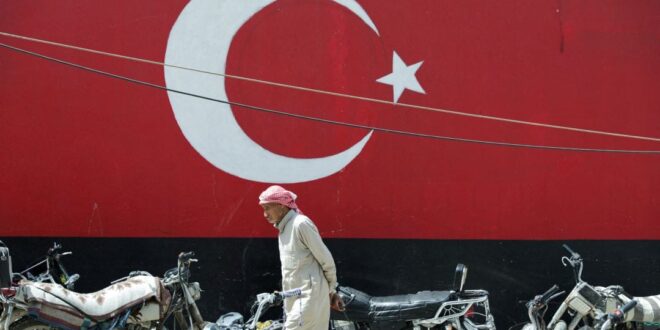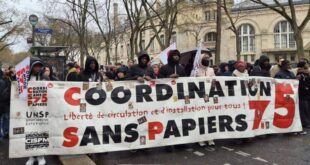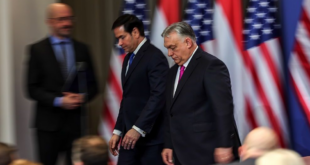Since the Syrian uprising began in 2011, Ankara has been drawn ever deeper into the crisis. Its approach will likely hold steady for now. But the choices it makes next matter for the fate of millions of Syrians.
Turkish President Recep Tayyip Erdoğan’s re-election has allayed fears among many Syrians that Ankara’s policy toward Damascus might dramatically change at their expense. With the Turkish leader firmly in the saddle for another five years, Ankara is intent on keeping its troops in parts of Syria’s north. It also seems likely that the over three million Syrian refugees in Türkiye will mostly be staying there, at least for the time being. Ankara has been talking to Damascus about renewing ties severed when the war broke out, and it will continue doing so, but Erdoğan’s new cabinet is staffed with officials who see too many national security concerns stemming from Türkiye’s southern neighbour to risk a precipitous shift in approach. For the refugees, along with millions more displaced in northern Syria, continuation of the status quo averts, or at least delays, the upheaval that a rupture in Turkish policy would cause. Yet it also leaves these Syrians in limbo, vulnerable to the vicissitudes of a war whose protagonists, Türkiye included, are pursuing largely irreconcilable objectives and lack clear strategies for achieving them.
Erdoğan enters his third presidential term in a strong position but facing a multitude of challenges. Türkiye is in an economic tailspin, which is putting serious political strain on Ankara’s approach of generosity toward the Syrian refugees. Ankara’s agreement in July to stop blocking Sweden’s accession to NATO will help smooth its relations within the alliance. But tensions with the U.S. remain, including over the Turkish purchase of Russian missile defence systems as well as Washington’s choice of the Kurdish-led Syrian Democratic Forces (SDF) as its main partner in its anti-ISIS campaign in Syria. Türkiye’s delicate relations with Russia also require constant recalibration, in part due to Ankara’s impasse with Moscow’s ally in Damascus.
” As Syria’s neighbour, Türkiye has far more at stake than most of the Arab countries that have moved to restore relations with Damascus. “
The war in Syria, in particular, presents a complex set of risks and opportunities for Ankara. Türkiye shares a 900km border with Syria and hosts some 3.3 million Syrian refugees. For four decades, it has been in conflict with the Kurdistan Workers’ Party (PKK), whose Syrian affiliate in the north east, the SDF, fought ISIS with U.S. backing and now holds a swathe of territory; along with the U.S. and EU, Türkiye considers the PKK a terrorist organisation. Two pillars of its national security policy are to prevent a further influx of refugees from among the nearly five million displaced people living precariously in north-western Syria, and to weaken, if not break, SDF (and by extension PKK) control of the north east. As Syria’s neighbour, Türkiye has far more at stake than most of the Arab countries that have moved to restore relations with Damascus. It remains deeply sceptical that Bashar al-Assad’s regime will prove willing or able to address these two concerns satisfactorily.
Since the start of the Syrian popular uprising in 2011, and throughout the civil war that followed, Türkiye has walked on a knife’s edge of short-term policies that have only drawn it deeper into the conflict. Like Western powers, Ankara took a firm stand against Assad at first, backing rebels in an attempt to oust the Syrian leader. But later, as it became clear that Assad would survive, it prioritised the twin objectives laid out above. To rein in the SDF, Ankara has launched four incursions into Syria since 2016. It regularly carries out drone strikes on SDF targets, and it routinely threatens further intervention to go after PKK operatives in Syria, whom it believes Washington and Moscow have ignored.
With an estimated 10,000 troops deployed in three parts of northern Syria, Türkiye has upped the ante, becoming a highly influential player capable of shaping the direction of the conflict. Damascus deems Türkiye an occupying power, as does the SDF, for its own reasons, while millions of displaced Syrians view the Turkish military as the only buffer between them and a brutal regime. The Turkish troops in Idlib, a province in north-western Syria, allow Ankara to honour a ceasefire negotiated with Russia in 2020, which has protected millions of people and stemmed the refugee flow. It has also allowed Hei’at Tahrir al-Sham, a former al-Qaeda affiliate still designated as a terrorist group by the UN and many states, to consolidate its control of the area. In northern Aleppo, Turkish military, police and intelligence agencies oversee a collection of Syrian factions called the Syrian National Army, which are widely accused of corruption and criminality. Farther east, Ankara is holding on to areas it captured from the SDF in 2018 and 2019. It frequently engages in tit-for-tat exchanges of fire with the group.
” Neither the military deployment in Syria nor the presence of millions of Syrian refugees is popular in Türkiye. “
Neither the military deployment in Syria nor the presence of millions of Syrian refugees is popular in Türkiye. The country’s plunging economy, coupled with nationalist-driven animosity toward the refugees, resulted in a swell of anti-Syrian rhetoric in the run-up to the May presidential and parliamentary elections. Both Erdoğan and his main opponent, Kemal Kılıçdaroğlu, spoke of returning refugees to Syria in their campaigns. Turkish opposition parties went so far as to promise normalised relations with Assad in order to ease refugee return and reduce Turkish military involvement in Syria. Partly to deflate such arguments, Erdoğan himself began making public overtures toward Damascus in mid-2022, participating in a series of discussions hosted by Russia, later also attended by Iran. His perceived attempt at mending fences with the Syrian regime sparked alarm among Syrians in both Türkiye and northern Syria, who feared they would fall victim to a bargain between Ankara and Damascus.
Erdoğan’s re-election seems to have temporarily removed the need for him to press ahead with substantive talks with Damascus. But municipal elections in 2024, perceived as high stakes by both the president and his opponents, will keep his Syria policy in the spotlight in the months ahead. The status quo keeps unanswered some major questions about Türkiye’s involvement in Syria, including the future of rebels it backs and areas it controls. Türkiye’s troop deployment in north-western Syria has deterred further regime offensives and thus solidified – for now, at least – these areas’ de facto autonomy from Damascus. Ankara is now convinced, and rightly so, that ending its deterrent role and enabling a return of regime forces would likely push many more refugees into Türkiye, with huge domestic political consequences. Maintaining control of these areas indefinitely is politically and financially costly, but arguably less so than the alternative in the Turkish government’s eyes.
” Türkiye’s fight with the Syrian Democratic Forces (SDF) has been limited to stopgap measures. “
Türkiye’s fight with the SDF has likewise been limited to stopgap measures. Turkish drone attacks in north-eastern Syria have killed several SDF cadres, many with ties to the PKK, whom Ankara has been after for years. Yet none of its military actions has loosened the group’s grip on territory or reduced its access to strategic resources, oil being the most important. At times, the strikes have resulted in civilian casualties, triggering international backlash. Moreover, some of the missiles have landed alarmingly close to U.S. forces in Syria and Iraq, further troubling Ankara’s relationship with Washington. A possible Turkish ground operation, which Erdoğan has repeatedly threatened, would likely accomplish little more than pushing SDF and PKK fighters a few kilometres farther away from the border.
Ankara has repeatedly reached out to Damascus, communicating quietly with regime security officials in part to test ways to address what Ankara sees as its main security concerns. Turkish and Syrian officials say the talks have focused on means of curbing the SDF’s reach in north-eastern Syria, a matter on which they presumably can find some common ground. Then, in mid-2022, the Turkish leadership began to signal publicly it was prepared to reconcile with the Assad regime, partly for electoral reasons, but also in response to requests from Russia, Iran and Iraq. The two countries’ top diplomats finally met in Moscow early the following May, along with their Russian and Iranian counterparts, but they failed to agree on concrete steps forward.
Yet even as it continues these meetings, Ankara has indicated it remains doubtful that Damascus will prove willing – or able – to address its main concerns. It remains unconvinced, for example, that the regime can regain territory in the north now under Turkish protection without causing millions more Syrians to flee across the border, much less allow for the existing refugees’ safe return from Türkiye. “Every kilometre that Damascus retakes sends thousands of refugees our way”, a senior Turkish official told Crisis Group in January. Ankara is also sceptical that Damascus can prevent PKK attacks from north-eastern Syria should Türkiye withdraw its forces and end its airstrikes. The Turkish leadership suspects that Damascus would be unable to establish more than a veneer of state presence in the north east, leaving the SDF in charge for all intents and purposes. Its return might thus boost the SDF’s legitimacy rather than bring the group to heel. For this reason, Ankara categorically refuses to discuss Damascus’ pre-condition for normalising relations – withdrawal of all Turkish troops from Syrian territory.
” For Syrians who were worried about the consequences of an opposition victory, [Erdoğan’s] win would seem to be cause for some relief. “
In sum, Erdoğan’s re-election likely means that little will change in Türkiye’s Syria policy. For Syrians who were worried about the consequences of an opposition victory, his win would seem to be cause for some relief. Those who support the regime or the SDF, on the other hand, have less to celebrate. Ankara’s priorities in Syria – addressing the threat it perceives from the SDF and stopping a regime offensive in Idlib that would drive more displacement toward Türkiye – will remain the same. Moreover, it seems unlikely that Erdoğan, even now re-elected, will lay out a longer-term vision for Türkiye’s Syria policy, given the uncertainty about what an endgame in Syria might look like and that Türkiye, for all its influence, is not the only or even most important actor with a say. In some ways, then, Syrian refugees and internally displaced will remain on tenterhooks.
Although Ankara probably will not show much inclination for a policy shift, it would be worth testing whether it can achieve some of its goals, particularly related to the SDF, through diplomatic avenues in Syria. As the U.S. experience in the two-decade “war on terror” shows, military means alone rarely resolve political problems. Türkiye cannot hope to solve its problem in north-eastern Syria by expanding the areas it controls without a plausible long-term vision for these territories. For now, it would benefit from articulating conditions for reducing tensions, especially if the SDF would also take de-escalatory steps, for example by reducing the PKK’s footprint in north-eastern Syria or by stopping its attacks on Turkish-held areas in Syria’s north. Notably, it was Erdoğan and his intelligence chief Hakan Fidan, foreign minister in the new cabinet, who first sat down with the PKK in late 2012 to negotiate a peaceful way out of that conflict. With his re-election campaign behind him and the PKK on the back foot militarily, the Turkish president may view the current moment as conducive to pursuing some form of détente with the SDF.
What Erdoğan will do remains to be seen, but in any case, the choice Ankara makes will help determine the course of the Syria conflict, as well as the fate of millions of Syrians living in Türkiye and the parts of Syria protected to one degree or another by Turkish soldiers.
 Eurasia Press & News
Eurasia Press & News



